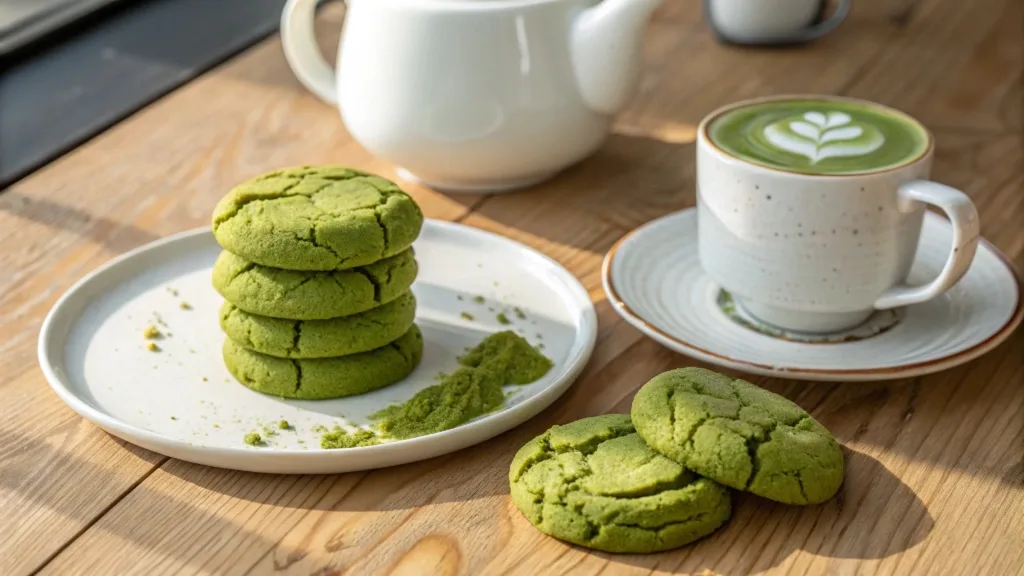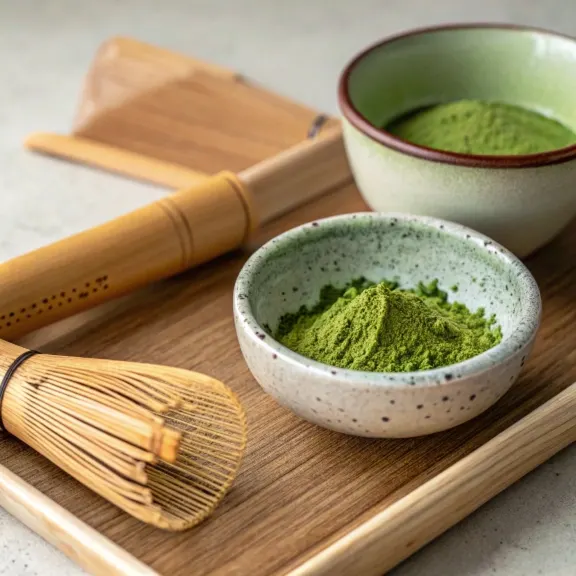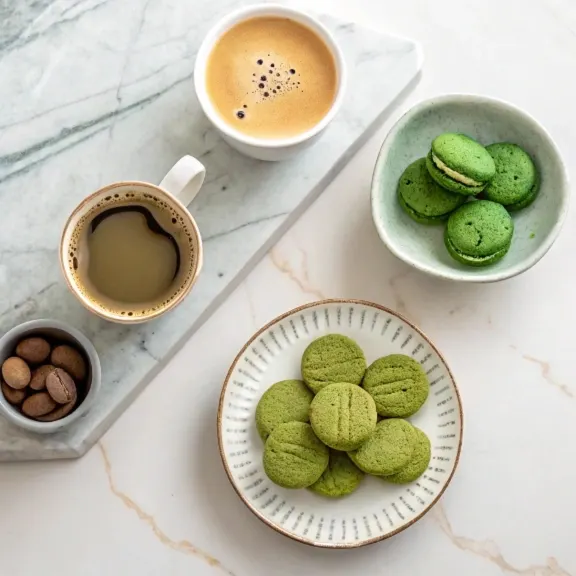These vibrant green matcha cookies are not only eye-catching but also perfectly chewy and subtly earthy—a fun twist on a classic treat that’ll make you feel like a pro baker, no fancy equipment needed! If you’re a matcha lover or simply curious about this trendy ingredient, you’ve probably wondered: Does a matcha cookie have caffeine? The answer is a resounding yes. But just how much caffeine is in a matcha cookie compared to your morning cup of coffee or green tea?

Jump To
What is Matcha and Why Do Matcha Cookies Have Caffeine?

Matcha is a finely ground green tea powder made from specially grown and processed tea leaves. Unlike regular green tea, where you steep and discard the leaves, matcha involves consuming the whole leaf in powdered form, giving you all the nutrients and caffeine in one go.
There are two main types of matcha you’ll encounter:
- Ceremonial-Grade Matcha: This high-quality matcha is used in traditional Japanese tea ceremonies. It has a delicate flavor, vibrant green color, and a smooth texture.
- Culinary-Grade Matcha: This type is more robust and slightly bitter, making it perfect for baking and cooking. It’s also more affordable than ceremonial-grade matcha.
Matcha originated in Japan and has been a staple of Japanese culture for centuries. Today, it’s used globally in drinks, desserts, and snacks for its unique earthy taste and numerous health benefits. Whether you’re making a matcha latte or matcha dessert recipes, the quality of matcha can impact both flavor and caffeine content.
For a delicious example of using matcha in baking, check out these soft and chewy matcha crinkle cookies that also pack a subtle caffeine boost.
How Much Caffeine Does a Matcha Cookie Have Compared to Coffee and Tea?

When asking “Does a matcha cookie have caffeine?”, it’s essential to understand matcha’s natural caffeine content. Since matcha is made from green tea leaves, it contains caffeine just like green tea or black tea. However, the caffeine in matcha is unique because it provides a slow-release effect, thanks to an amino acid called L-theanine. This combination promotes calm alertness rather than the jitters often associated with coffee.
How much caffeine is in matcha?
- Matcha Powder: The Key Ingredient for Caffeine in Cookies: On average, 1 teaspoon (about 2 grams) of matcha powder contains 64-70 mg of caffeine.
- Green Tea: A standard cup of green tea has 30-50 mg of caffeine.
- Coffee: A typical cup of coffee contains 95-120 mg of caffeine.
Factors like the quality of matcha and how much you use in your baking will influence the final caffeine content. For example, using culinary-grade matcha in cookies tends to deliver a stronger caffeine punch compared to ceremonial-grade matcha.
This means each matcha cookie can contain anywhere from 8 to 22 mg of caffeine, depending on the recipe. That’s roughly equivalent to half a cup of green tea.
Does a Matcha Cookie Have Caffeine?
To directly answer the question: Yes, a matcha cookie does have caffeine. Because matcha is made from whole green tea leaves, any baked goods containing matcha powder will naturally contain caffeine. But just how much caffeine are we talking about?
Caffeine Estimates for Matcha Cookies:
- A typical matcha cookie recipe uses about 1 tablespoon of matcha powder for a batch of 12 cookies.
- Each cookie, therefore, contains approximately 8-12 mg of caffeine, depending on the strength and quality of matcha used.
- Some recipes, like those that use extra matcha powder for a stronger flavor, can have up to 22 mg of caffeine per cookie.
How Does This Compare to Other Caffeinated Treats?
- Green Tea: A cup of brewed green tea contains about 30-50 mg of caffeine.
- Coffee: A standard cup of coffee has around 95 mg of caffeine.
- Dark Chocolate: A 1-ounce piece of dark chocolate contains about 12 mg of caffeine.
If you’re sensitive to caffeine, eating one or two matcha cookies won’t keep you up at night. However, if you’re particularly sensitive or trying to avoid caffeine, be mindful of how many cookies you enjoy.
For a balanced treat, consider pairing your cookies with a savory snack like this Taco Bell chicken quesadilla copycat recipe for a delicious meal.
Health Benefits of Matcha Cookies: More Than Just Caffeine
Matcha isn’t just a trendy ingredient – it’s a superfood packed with health benefits. Adding matcha to your cookies means you’re not only getting a tasty treat but also a boost of nutrition.
Key Health Benefits of Matcha:
- Rich in Antioxidants: Matcha is loaded with catechins, powerful antioxidants that help fight free radicals and protect cells.
- Boosts Metabolism: Matcha can enhance your metabolism and support weight loss efforts.
- Slow-Release Energy: The combination of caffeine and L-theanine in matcha provides sustained energy without the jitters.
- Promotes Calm Focus: L-theanine promotes relaxation and focus, making matcha a great energy booster for work or study.
- Detoxifying Properties: Chlorophyll in matcha helps detoxify the body naturally.
Matcha Cookies for Energy:
Thanks to the caffeine and L-theanine combination, matcha cookies are excellent energy-boosting desserts. Whether you need a pick-me-up in the morning or a post-lunch treat, these cookies give you a gentle lift without a caffeine crash.
Plus, vegan matcha cookies can be made with healthier ingredients like almond flour, coconut oil, and maple syrup, making them a guilt-free indulgence.
Why Vegan Matcha Cookies are the Perfect Energy-Boosting Treat
Vegan matcha cookies are an excellent choice for anyone looking for a healthier, allergen-friendly treat. Here’s why you should give them a try:
Benefits of Vegan Baking:
- Dairy-Free and Egg-Free: Vegan matcha cookies use substitutes like coconut oil or vegan butter instead of dairy, making them suitable for lactose-intolerant individuals.
- Healthier Ingredients: You can use natural sweeteners like maple syrup or coconut sugar to reduce refined sugar content.
- Environmentally Friendly: Vegan recipes are more sustainable since they avoid animal products.
Taste and Texture:
Vegan matcha cookies are typically soft, chewy, and rich. Using ingredients like almond flour or oat flour can give them a delightful nutty flavor and smooth texture.
Whether you’re a seasoned vegan baker or just exploring plant-based recipes, vegan matcha cookies are easy to make and just as delicious as traditional ones.
For another vegan-friendly green tea delight, check out these soft and chewy matcha crinkle cookies.
Baking Tips for Making the Best Matcha Cookies with Caffeine
Want to ensure your matcha cookies turn out perfectly every time? Follow these essential tips:
1. Use High-Quality Matcha Powder
- Culinary-grade matcha is best for baking due to its stronger flavor and cost-effectiveness.
- Avoid low-quality matcha, as it can result in a dull, brownish color and a bitter taste.
2. Sift the Matcha Powder
- Sifting prevents clumps and ensures the matcha is evenly distributed in the dough, giving your cookies a smooth texture and consistent flavor.
3. Don’t Skip the Chill Time
- Chilling the dough helps the cookies hold their shape and prevents excessive spreading.
- It also allows the flavors to meld, enhancing the earthy taste of matcha.
4. Bake One Tray at a Time
- For even baking, place one tray in the oven at a time and rotate it halfway through the baking process.
5. Avoid Overbaking
- Bake the cookies just until the edges are set. The centers should still look slightly soft. This ensures they remain chewy rather than hard.
Delicious Variations of Matcha Cookies with Caffeine
Matcha cookies are incredibly versatile! Here are some delicious variations to try:
1. Matcha Chocolate Chip Cookies
- Add semi-sweet or dark chocolate chips to your matcha cookie dough for a classic flavor pairing. The bitterness of dark chocolate complements the earthy matcha perfectly.
2. Matcha White Chocolate Cookies
- For a sweeter twist, mix in vegan white chocolate chips. The creamy sweetness of white chocolate balances the slight bitterness of matcha, creating a delightful contrast.
3. Gluten-Free Matcha Cookies
- Replace regular flour with almond flour or a gluten-free all-purpose flour blend. This makes the cookies suitable for gluten-intolerant individuals without compromising on taste or texture.
4. Nutty Matcha Cookies
- Add chopped walnuts, pecans, or macadamia nuts for extra crunch and a nutty flavor that pairs beautifully with matcha.
5. Holiday Matcha Cookies
- Use these vibrant green cookies for special occasions like St. Patrick’s Day or Christmas. You can add festive decorations like red sprinkles or a drizzle of white chocolate.
How to Store and Freeze Matcha Cookies to Retain Flavor
To keep your matcha cookies fresh and delicious, proper storage is key. Here are some simple guidelines for storing and freezing matcha cookies:
How to Store Matcha Cookies:
- At Room Temperature:
Store the cookies in an airtight container at room temperature for up to 3-7 days. Adding a small slice of bread to the container can help maintain moisture and keep the cookies soft. - In the Fridge:
If you want to extend their freshness, you can store them in the fridge for up to 2 weeks. Just ensure they are in a tightly sealed container to prevent them from drying out.
Freezing Matcha Cookies:
- Freezing Baked Cookies:
Place baked cookies in a single layer on a baking sheet and freeze for 1-2 hours. Then transfer them to a freezer-safe bag or container. They will stay fresh for up to 3 months. Thaw at room temperature before serving. - Freezing Cookie Dough:
Scoop the dough into balls and freeze on a tray until firm. Store the dough balls in a freezer bag for up to 3 months. When you’re ready to bake, let them thaw for 10-15 minutes, then bake as usual.
Common Mistakes When Baking Matcha Cookies and How to Fix Them
Baking with matcha can be simple, but a few common mistakes might impact your results. Here’s how to avoid them:
1. Using Low-Quality Matcha
- Low-quality matcha can lead to a dull color and bitter taste. Always use culinary-grade matcha for baking.
2. Not Sifting the Matcha Powder
- Matcha tends to clump. Sift the matcha with your dry ingredients to avoid lumps and achieve a smooth texture.
3. Over-Measuring Matcha
- Too much matcha can make your cookies overly bitter. Stick to the recommended amount (1-2 tablespoons per batch).
4. Skipping Chill Time
- Chilling the dough helps prevent excessive spreading and enhances flavor. Don’t skip this step!
5. Overbaking the Cookies
- Bake just until the edges are set. Overbaking can lead to dry, crumbly cookies instead of soft, chewy ones.
Matcha Cookies for Different Occasions
Matcha cookies are versatile and perfect for various occasions. Their vibrant green color and unique flavor make them a hit at events and celebrations:
1. St. Patrick’s Day
- The natural green hue of matcha cookies makes them ideal for St. Patrick’s Day festivities. Add green sprinkles or white chocolate drizzle for extra flair.
2. Holiday Gifts
- Pack matcha cookies in decorative tins or boxes for a thoughtful homemade gift during the holidays.
3. Tea Parties
- Serve matcha cookies alongside a matcha latte or traditional green tea for an elegant tea party treat.
4. Kid-Friendly Snacks
- Make matcha cookies fun for kids by adding chocolate chips or colorful sprinkles.
5. Office-Friendly Treats
- These cookies offer a gentle caffeine boost, making them a perfect afternoon snack to share with coworkers.
Pairing Suggestions for Matcha Cookies
Matcha cookies are delightful on their own, but pairing them with the right drink or snack can elevate your experience. Here are some perfect pairings:
Drinks:
- Matcha Latte: Double up on matcha flavor by enjoying your cookies with a creamy matcha latte. The milkiness complements the earthy notes of the cookies.
- Green Tea: A hot cup of green tea enhances the flavors and provides a soothing combination.
- Coffee: For a caffeine kick, enjoy your cookies with a freshly brewed coffee. The bitterness of coffee pairs nicely with the sweetness of the cookies.
Savory Pairings:
- Quesadillas: Need a savory balance? Try these matcha cookies with a Taco Bell chicken quesadilla copycat recipe for a fun contrast.
- Cheese Board: Serve matcha cookies with mild cheeses like brie or cream cheese for an elegant snack platter.
FAQs
How much caffeine is in a matcha cookie?
Each matcha cookie contains between 8-22 mg of caffeine, depending on the amount of matcha used. That’s roughly half the caffeine in a cup of green tea.
Can I make caffeine-free matcha cookies?
Yes! Use decaffeinated matcha powder or replace matcha with spirulina for a similar green color without caffeine.
What’s the best matcha for baking?
Culinary-grade matcha is ideal for baking due to its stronger flavor and affordability.
Why are my matcha cookies bitter?
Bitterness can come from using low-quality matcha or adding too much matcha powder. Use high-quality matcha and stick to the recommended measurements.
How do I store matcha cookies?
Keep the cookies fresh by storing them in an airtight container at room temperature for up to a week, or freeze them for as long as three months.
Conclusion
Matcha cookies are a delicious and unique treat that offers a beautiful green color, a subtle earthy flavor, and a gentle caffeine boost. If you’ve ever wondered, “Does a matcha cookie have caffeine?”, the answer is yes! Each cookie contains a modest amount of caffeine, making them perfect for a mid-morning snack or afternoon pick-me-up.
These cookies are not only tasty but also packed with health benefits like antioxidants and metabolism-boosting properties. Whether you prefer them vegan, gluten-free, or with chocolate chips, there are endless ways to customize matcha cookies to suit your taste.
For another green tea-inspired delight, try these soft and chewy matcha crinkle cookies. And if you’re craving something savory, check out this Taco Bell chicken quesadilla copycat recipe for a balanced meal. Explore more recipes on Recipes Chrono, where flavor meets simplicity.
